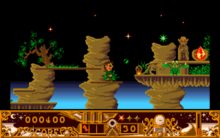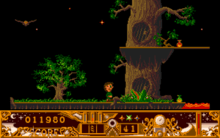Twinworld
Twinworld (also spelled TwinWorld or Twin World) is a video game, published by Ubi Soft for the Amiga and Atari ST in 1989. Ports for the Commodore 64, Amstrad CPC, and Acorn Archimedes were released in 1990.
| Twinworld | |
|---|---|
| Developer(s) | Blue Byte |
| Publisher(s) | Ubi Soft |
| Composer(s) | Haiko Ruttmann |
| Platform(s) | Amiga, Atari ST, C64, Acorn Archimedes, Amstrad CPC, ZX Spectrum |
| Release | 1989 |
| Genre(s) | Platform |
| Mode(s) | Single-player |
Twinworld is a platform game with a fantasy setting. Ulopa is a prince and the sole survivor of the Cariken royal family. Ulopa must travel through 23 levels to find the stolen amulet and confront the evil wizard Maldur.
Gameplay


The 23 levels are set in five different "worlds": a normal rural landscape, a forest, a medieval-style fortress, swamps and finally the temple of the evil wizard Maldur. The first four "worlds" have five levels each, and Maldur's temple has three, with the last being a special "boss" level.
The gameplay mainly involves jumping between different platforms and shooting magical bouncy balls at enemies, which come in the form of various evil-looking fantasy animals. To complete a level, Ulopa must find a piece of the stolen amulet and go through the exit door.
Enemies
Various enemies in Twinworld include:
- Argous
- A predatory bird. Comes in two varieties: one flies around the screen in a pre-defined pattern, the other homes in on Ulopa. Takes three hits.
- Bothria
- Arguably the most dangerous enemy. A three-headed dragon that initially stands motionless, but firing on it separates it into three separate monsters, one walking and the other two flying, each taking several hits. One of the flying monsters will try to escape to the level exit, and if it succeeds, start firing bullets when encountered again. The other flying monster will chase the player akin to the second variety of Argous.
- Goulou
- Resembles a troll or a goblin. Takes three hits.
- Green Goulou
- A kind of lizard. Initially takes one hit but later two hits. In Maldur's Temple, Green Goulous learn to fly.
- Hiboussa
- Resembles an owl. Sits motionless on a tree branch, but will swoop down on Ulopa if he passes underneath it. Takes four or five hits.
- Maldur
- The boss enemy of the entire game. He only appears on the last level. He initially is only on the background, summoning various other enemies, but at the end of the level, he transforms into a giant dragon, shooting bullets at Ulopa and taking very many hits to kill. Maldur is the last enemy in the entire game.
Worlds
The levels are divided into five different worlds.
- "Caves"
- The first world is the only one without a name. It is a rural landscape, with various cliff formations that Ulopa can walk on. Spread out through the landscape are doors, through which Ulopa can enter caves. Inside the caves, there are tunnels leading back to the surface and to other parts of the caves. In the caves, Ulopa can collect jewels for bonus points.
In the first world, falling through the bottom of the screen on the surface landscape will kill Ulopa, instead of dropping him down to the caves.
- Dark Forest
- The Dark Forest consists of trees that are over ten times as tall as Ulopa. The screen is divided between the tree roots and the tree tops. Doors on the tree trunks lead between the root and top parts, and if Ulopa falls down from a tree top, he drops down to the root part. In the forest, Ulopa can collect various flowers and fruits for bonus points.
In the Dark Forest, the game introduces two new items: an eye which makes Ulopa temporarily invulnerable, and a parachute which allows him to fall down from greater heights. The Hiboussa only appears in the Dark Forest.
- Blackthorn
- Blackthorn is a fortress with a moat under it. As in the previous worlds, doors lead between the different parts, and Ulopa can drop down from the fortress into the moat underneath. In Blackthorn, Ulopa can collect various pieces of jewellery for bonus points. Also, Ulopa's appearance seems to change when he reaches Blackthorn. He has a hat and a beard, indicating that he possibly ages during the game.
The moat in Blackthorn is the only part of the game that is filled with water. This affects Ulopa's movements, giving him greater inertia. He also swims when he jumps, allowing him to make longer jumps and float down more slowly. Various kinds of fish appear as the enemies in the moat.
- Swamps of Montain
- The Swamps of Montain mostly resemble the first world, except in this case Ulopa can fall down into the gold mines below the ground when he falls through the bottom of the screen. On the surface, Ulopa can collect flowers and fruits, and in the mines, he can collect gold for bonus points.
In the Swamps of Montain, blue bullets (Ulopa's most powerful weapon) don't disappear after they hit an enemy, but instead keep on bouncing onwards. This allows Ulopa to kill more enemies with a single bullet.
- Maldur's Temple
- Maldur's Temple only consists of three levels, rather than five. Two of them are normal levels, and on the third level, Ulopa finally faces Maldur himself.
In Maldur's Temple, Ulopa can use doors and stairways to move through different parts of the levels. As in the previous world, blue bullets can kill more than one enemy.
All five worlds also have a "bonus level". For the first four worlds, the last level of the world acts as a bonus level. In the last level of Maldur's Temple, after killing Maldur, a secret door opens to a mini-sized bonus level. If Ulopa dies in a bonus level, he automatically proceeds to the next world, without losing a life.
Reception
| Reception | ||||||
|---|---|---|---|---|---|---|
| ||||||
"It is an excellent game which is an insane lot of fun."
Bernd Zimmermann in ASM issue 2/1990[1]
References
- Twinworld review in ASM issue 2/1990, p. 30, ISSN 0933-1867 here
External links
- TwinWorld at Amiga Hall of Light
- Twinworld at Atari Mania
- Twin World at SpectrumComputing.co.uk